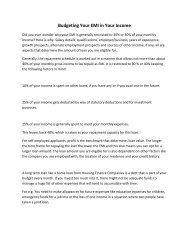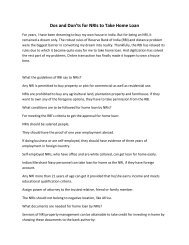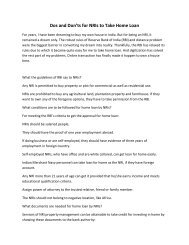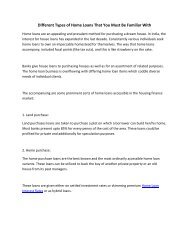Are you eligible for a home loan Top 4 points to know (1)
You also want an ePaper? Increase the reach of your titles
YUMPU automatically turns print PDFs into web optimized ePapers that Google loves.
<strong>Are</strong> <strong>you</strong> <strong>eligible</strong> <strong>for</strong> a <strong>home</strong> <strong>loan</strong>? <strong>Top</strong> 4 <strong>points</strong> <strong>to</strong> <strong>know</strong><br />
ACQUIRING a <strong>home</strong> <strong>loan</strong> can be an arduous task as each lender has its own criteria <strong>for</strong> evaluating a <strong>loan</strong><br />
application. Here are a few fac<strong>to</strong>rs that almost all lenders consider.<br />
Disposable income<br />
Your disposable income is one of the most important parameters <strong>for</strong> vetting <strong>you</strong>r <strong>home</strong> <strong>loan</strong> application.<br />
It is derived by deducting <strong>you</strong>r statu<strong>to</strong>ry deductions, monthly expenses and existing EMIs from <strong>you</strong>r<br />
gross income. A lender will expect <strong>you</strong>r <strong>loan</strong> EMI <strong>to</strong> be within 40% of <strong>you</strong>r monthly disposable income.<br />
However, some lenders consider <strong>you</strong>r gross income <strong>for</strong> judging <strong>you</strong>r <strong>home</strong> <strong>loan</strong>. If <strong>you</strong>r disposable<br />
income is comparatively low and <strong>you</strong> wish <strong>to</strong> opt <strong>for</strong> a higher <strong>loan</strong> amount, <strong>you</strong> may consider adding<br />
working members of <strong>you</strong>r family, like <strong>you</strong>r spouse or children, as co-applicants.<br />
Credit his<strong>to</strong>ry<br />
Lenders judge <strong>you</strong>r creditworthiness through <strong>you</strong>r credit score. A low credit score may reduce the<br />
chance of getting a <strong>home</strong> <strong>loan</strong> or can lead <strong>to</strong> a higher interest rate. Don’t apply <strong>for</strong> <strong>loan</strong>s with <strong>to</strong>o many<br />
lenders within a short period as it can pull down <strong>you</strong>r credit score. CIBIL classifies a credit score of over<br />
770 as a good credit score. However, other credit bureaus may have different scoring patterns and<br />
yardsticks <strong>for</strong> a ‘good credit score’.<br />
Compliance with legal norms<br />
Lenders verify details of the property <strong>for</strong> which <strong>you</strong> are taking the <strong>loan</strong>. They provide <strong>loan</strong>s <strong>to</strong> house<br />
properties that have been cleared by local authorities and have clear and valid title. Some banks offer<br />
special <strong>loan</strong> packages on properties listed in their database of approved projects. Properties in their<br />
database are considered reliable as they do the due diligence of the projects themselves.<br />
Occupation stability and continuity<br />
Lenders prefer <strong>to</strong> give <strong>home</strong> <strong>loan</strong>s <strong>to</strong> people with a stable job or income source. They also consider how<br />
long <strong>you</strong> have been working with <strong>you</strong>r present employer. Switching <strong>to</strong>o many jobs during <strong>you</strong>r career<br />
may create a negative impression. Government and PSU employees are the most preferred ones<br />
followed by doc<strong>to</strong>rs, chartered accounts and employees of <strong>to</strong>p private-sec<strong>to</strong>r companies.<br />
Age of the applicant<br />
Your age plays a major role during the approval process of the Loan on Property. Although <strong>home</strong> <strong>loan</strong>s<br />
carry maximum tenure of 30 years, banks prefer borrowers <strong>to</strong> finish repayment by the time they are 60–<br />
70 years of age. Thus, people in the 25–45 age groups are preferred as they have more than 20 years of<br />
their working life <strong>to</strong> pay off their <strong>home</strong> <strong>loan</strong>s.
Generally, public sec<strong>to</strong>r banks are the most stringent when it comes <strong>to</strong> <strong>loan</strong> approval process. However,<br />
their Property Loan Interest Rate is also the lowest. The reverse is true <strong>for</strong> housing finance companies<br />
and other NBFCs. Approach the NBFCs if bigger banks refuse <strong>to</strong> finance <strong>you</strong>r <strong>home</strong> purchase. You can<br />
transfer <strong>you</strong>r <strong>home</strong> <strong>loan</strong> later. While most of the fac<strong>to</strong>rs that banks consider have <strong>to</strong> do with <strong>you</strong>, the<br />
legality of <strong>you</strong>r house property is something that is beyond <strong>you</strong>r control.<br />
Thus, always ensure that the property has all the required clearances be<strong>for</strong>e making the final decision.<br />
[Source: http://www.financialexpress.com/personal-finance/are-<strong>you</strong>-<strong>eligible</strong>-<strong>for</strong>-a-<strong>home</strong>-<strong>loan</strong>-<strong>to</strong>p-4-<br />
<strong>points</strong>-<strong>to</strong>-<strong>know</strong>/414658/]

















